NEWS
SYNOPSIS
‘The Unwinking Gaze’ offers a unique, behind-the-scenes insight into the recent working life of Tibet’s would-be saviour and revered world icon the Dalai Lama.
The Unwinking Gaze was filmed over a period of three years with exceptional access showing the daily agonies of the Tibetan leader as he tries to strike a balance between his Buddhist vows and the realpolitik needed to placate China. David and Goliath is played out in front of us as the world’s emerging superpower and the Dalai Lama walk a tightrope over an issue of global importance.
‘The Unwinking Gaze’ is not 3 years in the life of the Dalai. It is his life’s work in 3 years. This film takes you inside the Titanic struggle of one of the great spiritual and political figures of our time, as he tries to lead his people to a peaceful resolution with China.
BACKGROUND
Joshua Dugdale, director of the film, explains his motivation:
I had seen a number of films on the Dalai Lama, but I felt they didn’t show who he really was. It seemed that he was being wheeled out for the cameras, for stage managed set pieces. Knowing that the rhetoric from Beijing claimed that the Dalai Lama was a canny political operator, intent on conning the West into backing his efforts to split off Tibet and weaken China, I wondered whether there was a way of showing his actions and reactions on camera. I hoped to be able to reveal his true intentions and character and I wanted to create a film, which would show the real world of the ‘splittist’ Dalai Lama so that those in power in Beijing might be able to make more informed decisions about how they deal with him. With such an enigmatic figure, the only way to achieve this was to treat him like any other politician, showing the world he inhabits and the challenges he faces. The result is extraordinarily rare access into the world of one of the great spiritual leaders of our time.
FAQ
Is the Dalai Lama a potential partner for the Chinese?
Do the Chinese really want to talk to the Dalai Lama?
How important is the Dalai Lama to China?
Would he have a positive or negative effect to the PRC?
What can both sides do to move the talks on?
Post Dalai Lama - Who or what comes next?
Is violence a realistic possibility?
What will happen if the Dalai Lama dies in exile?
How effective are the West in allying to his cause? How much can they do?
The role of translation in the secret talks - Could a lack of clarity between the two sides be hampering a resolution?
Economic Development in Tibet - Can the Chinese do it without the Dalai Lama?
The Legacy - What is the Dalai Lama's legacy?
The Olympics - Should the Chinese invite him without conditions?
Is the Dalai Lama sincere?
And is he a potential partner for the Chinese?
You need to watch the film to make up your own mind on this. The Dalai Lama has said in public that he doesn’t want independence over one hundred times, including reiterating it every year since 1987 in his annual March 10th Statement. However the Chinese believe that this is just a plot to enable him to return before permitting his people to declare independence. Many Tibetan exiles do want independence (see www.freetibet.org) and, it could be argued allow the hard-line members of the Chinese in government to argue that independence is the end game of the Dalai Lama. As to whether he is a potential partner for the Chinese, the one thing you can say is that despite being very unsuccessful in his strategy, he still has unswerving support among his people. If any Tibetan can bring the people in line, it is the Dalai Lama.
Last | NextDo the Chinese really want to talk to the Dalai Lama?
The views of the Chinese government are notoriously difficult to assess due to the levels of secrecy and impenetrability in the high echelons of government. Many believe however that there are a number of issues, not least where the Dalai Lama would live, and possibly most importantly how they would explain a rapprochement to the Chinese people. They have been criticising him continuously for 49 years. For them to turn around and say actually the Dalai Lama is not a bad man, would require a degree of political bravery that would be unusual in a Communist Political System. There is, it is believed, a robust debate going on in Beijing at the moment no doubt fuelled by the events of the recent days as to the possibility of changing direction but all decisions are mired in the internal politics of the Chinese leadership
Last | NextHow important is the Dalai Lama to China?
Would he have a positive or negative effect to the PRC?
There can be little doubt that the Dalai Lama is a very significant figure not just in Tibet. There are believed to be more than 100m Buddhists in China, all of whom would have great respect for the Dalai Lama. There also seems to be a growing demand for spirituality generally in China, which coming from a low base after the Culutral Revolution, would mean that the Dalai Lama would automatically become the main religious and spiritual leader in China. It is this, which has historically been one of the key reasons for the Chinese government’s fear that there will be sources outside of the Communist party, which will be difficult to control. A classic example is the persecution not only of the Tibetan Buddhists but also of Falung Gong. Whether the Dalai Lama would have a positive or negative effect to China is an interesting question. Understanding his core values it would be hard to imagine how his presence would have a negative effect for China. Whether the same could be said about his effect on the Communist party is a different question.
Last | NextWhat can both sides do to move the talks on?
The first step would be to publicly acknowledge that there is a dialogue. In order for the process to move forward, a framework needs to be created for discussions. The Chinese government would therefore have to come forward and say publicly that there is an issue, which needs to be resolved. Currently they refuse to acknowledge that there is any issue worthy of discussion. However as news pours out of Tibet under the current civil unrest, news media in China has acknowledged what is going on (see http://news.xinhuanet.com/english/2008-03/15/content_7792827.htm). There is a great deal of uncertainty as a result but it will be hard for the government to deny that there is an issue. The Dalai Lama’s envoys are currently considered to be ‘tourists’, and the Dalai Lama is still a ‘Splittist’ who is continuously engaging in activities aimed at weakening China. These public pronouncements would need to change.
Last | NextPost Dalai Lama - Who or what comes next?
This is a question that has many different potential outcomes. The Dalai Lama himself has actively considered the possibility of ending the reign of the Dalai Lamas by deciding not to reincarnate. If he were to do this, then the 14th Dalai Lama would be the last of the line. His suggestions for the future leadership would be that politically there would elections for a lay person to lead the country, and that spiritually there would be some form of rotation between the four Buddhist sects or that there would be some form of voting system to decide, according to Professor Robert Thurman, ‘the most excellent Lama.’
Last | NextIs violence a realistic possibility?
There is no doubt that violence has been stopped by the leadership of the Dalai Lama although the Chinese leadership are currently suggesting that he is orchestrating the violence that is now unfolding in Tibet. It is unlikely that any successor will have the strength of leadership or respect to ensure that all Tibetans follow the party line as they have done up until now. Whether that means we could see the Tibetan Revolutionary Liberation Army, which in itself seems a misnomer as a result of the Dalai Lama’s efforts, is impossible to say at this stage but it is likely that there will be considerable instability without his leadership.
Last | NextPost Dalai Lama - What will happen if the Dalai Lama dies in exile?
Again practically, the political leadership and cabinet – the Kashag and the Prime Minister, will take the lead role in deciding policy. There will automatically be a vacuum if the current Dalai Lama says he is going to reincarnate, however there are others who will step into the role. The likelihood is that there will be considerable fragmentation and instability as a result of his death which could result in firstly a weaker Tibetan Freedom Movement (not Independence Movement) but more likely to be some fringe radical groups who will start to think about changing their allegiance to non-violence. The Chinese may decide to repeat the Panchen Lama strategy of imprisoning the Tibetan chosen reincarnation of the Panchen Lama and impose their own choice. This is unlikely to unite the Tibetan population behind their rule and will almost certainly decrease their legitimacy.
Last | NextHow effective are the West in allying to his cause?
How much can they do?
Ostensibly not much. Most western powers are in thrall to the Chinese due to the size of the market in China, so China is in a very strong position economically and politically. Their role on the UN and the importance of keeping them on side for issues that have been higher up the international agenda such as Darfur or the Middle East, means that Tibet, for almost 20 years has never been a deal breaker when it comes to relations with the West. However up until now there has been a continuous drip, drip of pressure which causes embarrassment to the Chinese and will always be a thorn in their attempts to be seen as the legitimate government in Tibet.
Last | NextThe role of translation in the secret talks - Could a lack of clarity between the two sides be hampering a resolution?
The film reveals the astonishing recounting of the discussion between the Dalai Lama’s envoys and the Chinese delegation from the United Front Department. It appears that the Chinese have been confused by the Dalai Lama’s statements that he wants Tibetans to win freedom, by translating it to mean independence. If this can be taken at face value it would be a truly extraordinary development. The more cynical view however would say that the Chinese are using every tactic they can to delay moving the talks on which includes bringing up as many issues that require clarification as possible before they commit to any mutual agreement for negotiations.
Last | NextEconomic Development in Tibet - Can the Chinese do it without the Dalai Lama?
This is probably one of the key issues in the Chinese achieving their aim of obtaining legitimacy in Tibet. However currently most of the benefit of the significant sums of money being poured into Tibet is ending more into the pockets of Chinese businessmen and then into the pockets of Han Chinese migrant workers than the Tibetans themselves. Tibetans, due to the handicap of language and skills, are often marginalised. This pours severe doubt on whether the current policy will ever achieve the legitimacy that the Chinese government would like.
Last | NextThe Legacy - What is the Dalai Lama's legacy?
The Dalai Lama is one of the great figures of the 20th and 21st Century. He has won the Nobel Peace Prize and countless other awards. He has sold books to an international audience and sells out in stadiums across the world who seek to benefit from his teachings. On his watch, he has presided over a significant increase in the practice of Buddhism globally over a century when religious practice in China, the largest Buddhist country in the world has been subject to substantial persecution. He has also been the global face of the Non-Violence movement, which in itself is an extraordinary legacy. However in terms of his success over achieving a negotiated settlement over his homeland of Tibet, he has up until this point failed in his key objectives.
Last | NextThe Olympics - Should the Chinese invite him without conditions?
This is a key question that we are asking as a result of the film. Some believe that the Dalai Lama attending the Olympics would be a PR coup for the Chinese and would mean that they would continue to do nothing after the Olympics. Others believe that it would be a necessary pre-condition to showing a softening in the position of the Chinese towards the Dalai Lama, paving the way for meaningful discussion post Olympics. No matter what, it would be an extraordinary moment that would be difficult for the Dalai Lama to turn down. See the Dalai Lama’s March the 10th Statement www.dalailama.com/news.215.htm for the up-to-date position of the Dalai Lama on the Olympics.
LastWHO'S WHO
His Holiness the 14th Dalai Lama

The Dalai Lama should need no introduction. Born in 1935, Tenzin Gyatso was just two years old when he was chosen as the 14th Dalai Lama. He has been the Tibetan Spiritual leader ever since during a period which has been full of turmoil. He was just 14 when China invaded Tibet and presided over an uneasy truce with the Chinese until 1959 when he fled into exile with his supporters. He has lived in Dharamsala in Northern India ever since. In 1987 he made a significant step in ending his demand for the complete independence of Tibet. He has received 84 awards and has written 72 books which would work out at one for every year of his life.
Last | NextLodi Gyaltsen Gyari
Special Envoy to the Dalai Lama
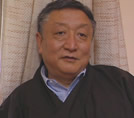 Lodi Gyaltsen Gyari (or Gyari Rinpoche) was born in a nomadic family in Nyarong, Eastern Tibet in 1949, the year of the Chinese invasion of Tibet. He was recognized as a young reincarnate lama and fled with his family into the safety of exile, joining the Dalai Lama in India.
Lodi Gyaltsen Gyari (or Gyari Rinpoche) was born in a nomadic family in Nyarong, Eastern Tibet in 1949, the year of the Chinese invasion of Tibet. He was recognized as a young reincarnate lama and fled with his family into the safety of exile, joining the Dalai Lama in India.
In his youth in India he played a very active part in the pro-independence movement and served as as President of the Tibetan Youth Congress in 1975. Gyari was elected to the Assembly of Tibetan People's Deputies, the Tibetan Parliament in exile, and subsequently became its Chairman.
Gyari has a unique role as Special Envoy to the Dalai Lama and has had the challenging job persuading the Chinese to resolve the current impasse. He has been in secret talks with the Chinese government since 2002. The Chinese have been very reluctant to acknowledge the talks, publicly describing Gyari and his team as tourists.
Last | NextProfessor Samdong Rinpoche
Prime Minister or Kalon Tripa of the Tibetan Government in Exile
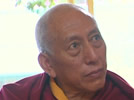 Born as Lobsang Tenzin in Jol eastern Tibet, he was recognised as the reincarnation of the 4th Samdhong Rinpoche. His early years were spent in Lhasa, Tibet, but like many others in 1959, he fled into exile to India.
Born as Lobsang Tenzin in Jol eastern Tibet, he was recognised as the reincarnation of the 4th Samdhong Rinpoche. His early years were spent in Lhasa, Tibet, but like many others in 1959, he fled into exile to India.
In 2000 the Dalai Lama decided that the Tibetan people in exile should elect their own head of government, and in July 2001 Lobsang Tenzin was elected with about 29,000 votes, or about 84% of those cast. It is believed that China regard him as a key member of the Dalai Clique and refuse to acknowledge his position of Prime Minister to the Tibetan Government in Exile.
Last | NextTenzin Geyche and Tenzin Taklha
Private Secretaries to the Dalai Lama
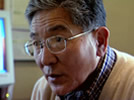 The two Tenzins have been known as the gatekeepers to the Dalai Lama and have guarded his privacy from the enormous attention generated by interest in the Dalai Lama.
The two Tenzins have been known as the gatekeepers to the Dalai Lama and have guarded his privacy from the enormous attention generated by interest in the Dalai Lama.
 Recently retired, Tenzin Geyche had been with the Dalai Lama for several decades. His young protégé, the American educated Tenzin Taklha, joined the Private Office in 2003.. Being Private Secretary means instant membership to the Dalai Clique.
Recently retired, Tenzin Geyche had been with the Dalai Lama for several decades. His young protégé, the American educated Tenzin Taklha, joined the Private Office in 2003.. Being Private Secretary means instant membership to the Dalai Clique.
His Holiness the Karmapa
Head of the Kagyu Sect
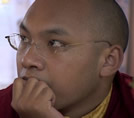 The Karmapa or Black Hat as he is known, is the head of the Kagyu Sect, one of the four main Tibetan Buddhist sects. Ogyen Trinley Dorje spent his formative years in Tibet under the Chinese. However, heavily controlled in Tibet he was seen by many as the future and at age 14, deciding that it would be better ‘for beings’ if he went into exile, he left Tibet for India.
The Karmapa or Black Hat as he is known, is the head of the Kagyu Sect, one of the four main Tibetan Buddhist sects. Ogyen Trinley Dorje spent his formative years in Tibet under the Chinese. However, heavily controlled in Tibet he was seen by many as the future and at age 14, deciding that it would be better ‘for beings’ if he went into exile, he left Tibet for India.
Ever since he has developed a close bond with the Dalai Lama and is seen as one of the key people for the future leadership of Tibet. However there is another pretender to the Karamapa position and to this day the issue has not been resolved. Nevertheless Orgen Trinley Dorje has the ear of the Dalai Lama, and is therefore seen by many as the true Karmapa. He is 23 years old.
Last | NextThe Venerable Ling Rinpoche
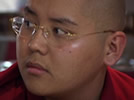 Ling Choktul Rinpoche is the reincarnation of the Dalai Lama’s former tutor – a favourite of the Tibetan leader and Spiritual head of the Dalai Lama’s Gelugpa Tradition, and the strong relationship has continued in his successor/reincarnate. Considered to be extremely bright and an excellent English speaker, the Dalai Lama is keen to ensure that he will play an important part in the future for his people. Ling Rinpoche is 23 years old.
Ling Choktul Rinpoche is the reincarnation of the Dalai Lama’s former tutor – a favourite of the Tibetan leader and Spiritual head of the Dalai Lama’s Gelugpa Tradition, and the strong relationship has continued in his successor/reincarnate. Considered to be extremely bright and an excellent English speaker, the Dalai Lama is keen to ensure that he will play an important part in the future for his people. Ling Rinpoche is 23 years old.
CREDITS
If you have any press queries please contact Rachel Devenport
Producer and Director![]() Joshua Dugdale
Joshua Dugdale
Executive Producer![]() Jane Bartlett
Jane Bartlett
Associate Producer![]() Jonathan Jenkins
Jonathan Jenkins
Editor![]() Scot Openshaw
Scot Openshaw
Online![]() Nick Cohen
Nick Cohen
DOP![]() Jonathan Jenkins
Jonathan Jenkins
Marketing![]() Dan Machen
Dan Machen
![]() Silence London
Silence London
![]() Faisal Ahmed
Faisal Ahmed
![]() Lee Henshaw
Lee Henshaw
Music![]() Simon West
Simon West
Vocals![]() Soname Yungchen
Soname Yungchen
DEBATE
Over the coming we weeks we will be asking you to join the debate. Please stay in touch through our website, Facebook, and MySpace and we will update you regularly. To go onto our mailing list please fill out the form below. As the film is an independent release if you would like to help organise screenings of the film please get in touch below.
Please fill out the form and you will go onto our mailing list.
If you have any press queries please contact Rachel Devenport
Directors Biography (PDF)
Notes (PDF)
Interview with the Director (PDF)
MEDIA CENTRE
If you have any press queries please contact Rachel Devenport
Directors Biography (PDF)
Notes (PDF)
Interview with the Director (PDF)
DISTRIBUTION
If you are interested in distribution for overseas markets then please contact: - info@mercurymedia.org
CONTACT
Please fill out form and we will endeavour to get back to you as quickly as possible.

